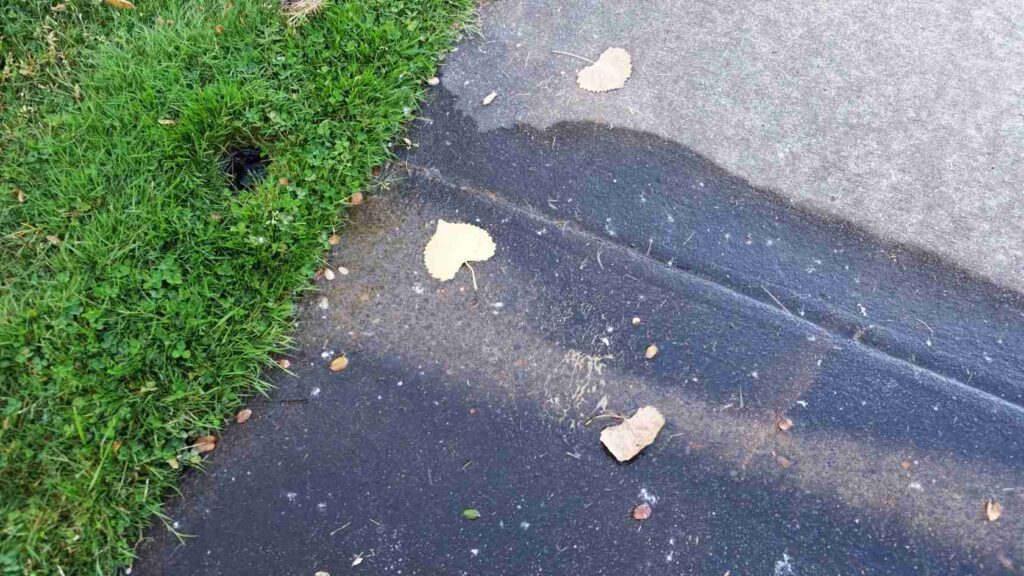Efficient Fixes: How To Stop A Sprinkler Leak Fast

Have you ever woken up to a mini lake forming in your yard, or noticed an unusually high water bill? If so, chances are you’ve been the unwilling host of a sprinkler leak. These pesky invaders can stealthily cause havoc on your beautiful lawn and skyrocket your water bills.
No one wants their garden turning into swampy marshland. But how do we stop this unwelcome guest?
The solution is closer than you think. With some basic knowledge about irrigation systems and the right tools, stopping these leaks can be as easy as baking chocolate chip cookies.
Moreover, we’ll guide you on how to repair minor issues yourself and when it’s time to call in the professionals. With our help, you can keep your lawn lush without letting a leak drain your wallet.
Table Of Contents:
- Understanding Sprinkler Leaks and Their Causes
- Identifying Signs of a Sprinkler Leak
- Shutting Off Your Water Supply During a Leak
- Common Causes of Sprinkler Leaks When System is Off
- Steps to Stop a Sprinkler Leak
- DIY Sprinkler Leak Repair Techniques
- Hiring Professional Help for Sprinkler
- FAQs in Relation to How to Stop a Sprinkler Leak
- Conclusion
Understanding Sprinkler Leaks and Their Causes
Sprinkler systems are essential tools for maintaining lush, green lawns. But they’re not immune to issues such as leaks which can cause wastage of water and increase your water bills. To effectively address a leaking sprinkler system or a leaking sprinkler head, you need an understanding of how these systems work.
How a Typical Sprinkler System Works
A typical lawn sprinkler system consists of several components working together in harmony. At the heart is the controller, acting like the brain by regulating watering cycles based on your input settings.
The controller sends signals to valves located within protective valve boxes throughout your yard. These valves control water flow from the main water supply into lateral lines leading up to individual sprinkling heads.
The sprinkle heads pop-up from ground level when activated by pressure build-up in their corresponding pipes and evenly distribute water across specified areas on your property – almost like showering it with liquid sunshine.
Common Causes of Sprinklers Leaks
Much like anything else around our homes that we regularly use, even high-quality irrigation systems may require repair due to common problems over time: pipe ruptures; valve malfunctions; broken or damaged sprinkler heads are just some examples.
- Pipe Ruptures: Pipes carrying pressurized water can rupture due to factors ranging from physical damage (like someone accidentally hitting them while digging) through age-related wear-and-tear downgrading their integrity overtime.
- Valve Malfunctions: Valves control whether specific sections (or zones) get irrigated during any given watering cycle. Faulty ones could either stick open causing continuous leakage after programmed cycles have ended, or fail to open entirely, depriving certain areas of needed hydration.
- Broken Sprinkler Heads: These are prone to damage by lawn mowers or kids playing in the yard. Broken heads may leak water continuously even when your system is off and significantly contribute towards inflated water bills over time.
Identifying Signs of a Sprinkler Leak
The first step to fixing any problem is recognizing there’s one. Do you suspect a leak in your irrigation system? Let me walk you through the telltale signs.
Spotting Unusual Wet Spots on Your Lawn
If your lawn is sporting some persistently damp patches, it could be crying out for help – yes, lawns can communicate. Excessive wetness between watering cycles or areas that never seem to dry up are classic symptoms of a leaking sprinkler system.
This isn’t just parts of your grass growing faster than others; it might indicate that water is escaping from somewhere it shouldn’t. And let’s face it – no one wants their hard-earned money seeping into the ground unnoticed. Don’t ignore these soggy hints; they’re often our first clue about lurking leaks.
Your Water Meter Doesn’t Sleep
You know what else doesn’t like sleep? A restless water meter. If all faucets and appliances in the house are off but the dial keeps spinning, then Houston we have a problem – most likely with our irrigation system.
Sudden Spike in Your Water Bills
An unexpected rise in watery expenditures, i.e., bills should also set alarm bells ringing. This unwanted surge suggests more water being used than usual, which again points towards potential leaks.
Uneven Growth of Grass
A patchy and uneven lawn, could also be signaling irrigation leaks. If certain sections of your grass are unusually lush or if you notice excessive weed growth, it might mean that these areas are receiving more water due to an underlying leak.
These signs may not always guarantee a sprinkler system leak, but they do warrant some detective work. It’s important to investigate further as early detection can save you from hefty repair costs down the line.
Shutting Off Your Water Supply During a Leak
If you spot signs of water waste, such as soggy patches on your lawn or an unusually high water bill, it might indicate that your irrigation system is leaking. Taking immediate action to shut off the water can help prevent further damage and save money.
Locating Your Irrigation System’s Water Supply
The first step in dealing with a leak is locating the main valve controlling the water supply to your sprinkler system. This valve could be inside a square box buried slightly below ground level near where the home’s main line branches out towards each zone of sprinklers.
This box often has green plastic lids marked ‘water’ or ‘irrigation’. Sometimes though, they blend into their surroundings much like chameleons, but keep looking until you locate them.
In some homes there may also be an indoor shutoff valve located somewhere close by such as laundry rooms or garages.
Smart Earth Sprinklers, one of our trusted partners, reminds us that knowing how to turn off the water supply when leaks occur can lead directly toward saving money on increasing monthly bills caused due to wasted resources – which no one likes anyway.
How To Shut The Valve Off Safely?
Safety comes first while shutting down any sort of valves linked with utility services within our houses including irrigation systems. Wearing protective gloves is essential to avoid potential injury while turning off the valve.
Most main valves are gate or ball types that require a quarter turn with a wrench for shutting them off. Be gentle as if dealing with fragile cookies. Turn it clockwise until it won’t go any further.
Common Causes of Sprinkler Leaks When System is Off
Sprinklers, like all mechanical systems, can experience issues. One such issue that baffles many homeowners is why their sprinkler system might leak even when it’s turned off.
Understanding Leaking Valves
The heart of any irrigation system lies in its valves. They control the water flow to different zones within your lawn. But what happens when these guardians of water supply start acting up? You get a leaking valve – a common reason for leaks even when the system is shut down.
A defective solenoid or an impaired diaphragm within the valve could be at fault here. This may lead to continuous dripping from sprinkler heads long after you’ve stopped watering cycles and turned off your controller. The cause? A slow but steady trickle coming from a malfunctioning valve.
In some cases, debris caught inside the valve can prevent it from closing completely – resulting in leaks that occur through low-head drainage (more on this shortly). Cleaning out trapped dirt or replacing worn-out parts should do the trick and stop those annoying drips. And remember: regular maintenance checks are essential for keeping your valves (and entire irrigation system) functioning properly. Smart Earth Sprinklers offers expert advice if you need help with maintaining or repairing your valves.
The Problem of Low-Head Drainage
Moving onto our second culprit behind persistent leaks – low-head drainage; sounds complicated but let me simplify it for you: imagine drinking milk through a straw; once done, there’s still some liquid left in that straw right?
This situation mirrors how low head-drainage occurs in an irrigation system post-watering. The remaining water in the lateral lines (the pipes that connect your sprinkler heads to the main pipe) will drain out through the lowest sprinkler head, causing it to leak even when switched off.
But, this issue often gets confused with a leaky valve problem. That’s because both situations show up as water dripping or trickling from certain sprinkler heads even after you’ve stopped the watering cycle.
Steps to Stop a Sprinkler Leak
The sight of water gushing out from your sprinkler system can make you want to grab the nearest chocolate chip cookies for comfort. But don’t panic. Stopping a sprinkler leak is easier than it seems.
Shutting Off Your Irrigation Controller
Your first move? Cut off the water flow at its source – that’s right, go straight for your irrigation controller. It’s like pulling the plug on a TV showing nothing but endless tv listings – it instantly stops any further activity. Make sure this ‘off’ status reflects in your system’s controller too.
This action won’t just stop additional water leaking, but also helps identify if the problem lies within one specific zone or throughout all zones of your lawn sprinkler system.
Finding The Leaky Culprit
To get to grips with our sneaky leaker, we’ll need some detective work (think less Sherlock Holmes and more home warranty inspector). Start by checking each zone’s pipes individually while keeping an eye out for excess watering cycles which could indicate trouble spots. RainMaster can help here.
If there’s still some water left after shutting down everything, it might be due to low-head drainage—a common issue in systems where the lowest head or lowest sprinkler drains residual water once turned off.
Sprinklers And Valves: A Tale Of Two Leaks
In our world of leaks occur often either through faulty valves or rogue sprinklers heads. Think about valve diaphragm as secret agents who control how much and when water should pass—when they malfunction (due probably because they’ve been compromised), you have got yourself a valve leaking situation.
For sprinkler heads, they’re like the front-line soldiers who get battered by everything from lawn mowers to pest control measures. It’s no wonder then that they are prone to breakages and leaks.
Sprinkler Leaks: The DIY Approach
Sprinkler leak identification can be a pretty straightforward task. No specialist knowledge is necessary, just a readiness to get stuck in and muck about.
DIY Sprinkler Leak Repair Techniques
If you’ve got a sprinkler leak, don’t fret. You can save money by fixing it yourself with these simple techniques.
Fixing Leaky Valves
The first step in your DIY journey is to tackle those leaky valves that could be the culprit of your irrigation leaks. But how do you know if it’s a valve leaking? If water is continuously flowing from the lowest head or there’s an unusual amount of water left after shutting off your system, then you likely have a faulty valve on hand.
A common cause for this might be damage to the valve diaphragm which requires replacing rather than repairing. To start this process, make sure to shut off your system’s controller and main water supply. RainMaster suggests looking for the sprinkler pipe branching from the main line and turning its adjacent valve to cut off water flow completely.
To replace a damaged diaphragm or solenoid valve, first open up your square box (also known as a ‘valve box’). Unscrew and remove both solenoid and bonnet before swapping out old parts with new ones like wire connectors for electricity supply connection back together.
Remember: Don’t over-tighten any screws.
Repairing Broken Sprinkler Heads
Moving onto another frequent issue – broken sprinkler heads. Lawn mowers are often culprits behind damaging these crucial components of our lawn care routine. Let’s learn how we can fix them ourselves without breaking our bank account.
You’ll need to find replacement heads matching existing ones in terms of spray pattern & distance. Before starting the repair, remember to turn off your irrigation system’s controller and water supply for safety.
Next, dig around the broken sprinkler head using a small spade or trowel. Make sure you don’t damage any lateral lines below. Unscrew damaged head from its swing pipe carefully and screw on new one in place ensuring it’s level with soil surface so that lawn mowers can glide over without damaging them again.
If you are experiencing ‘excess water flow’ even after the shut-off. This could be a major problem requiring urgent action to stop additional harm.
Hiring Professional Help for Sprinkler
Dealing with a leaky sprinkler system can feel like trying to find the chocolate chip cookie that’s hiding in your kid’s bedroom. It’s tricky, messy, and can lead to bigger problems if not handled properly. But don’t sweat it. Sometimes, calling in irrigation specialists is the best move.
The Value of Expertise
Imagine turning on your TV only to see static instead of your favorite show listed on the TV listings. You wouldn’t start fiddling around inside the television set yourself – you’d call an expert. The same applies when dealing with leaks in your lawn sprinkler system.
Irrigation specialists have years of experience under their belt – they’re pros at spotting where water is flowing when it shouldn’t be and stopping leaks fast. They also know how crucial maintenance schedules are to prevent future issues from popping up like unwanted weeds during watering cycles.
Finding Reliable Professionals
Finding professional help doesn’t need to be as hard as finding a decent parking spot during peak shopping hours. Start by asking neighbors or friends who take great pride in their lawns; chances are they’ve worked with local professionals before and can give you solid recommendations. The Irrigation Association’s directory is another useful resource.
Bear this in mind: while hiring professionals might seem similar to buying home warranty coverage (you hope never having to use it), getting experts involved early could save money down the line because small leaks left unattended often become big expensive ones later.
Sprinklers Are More Than Just Watering Lawns
It’s easy to consider your sprinkler system as another mere household device, akin to the lawnmowers in your garage. But unlike other appliances that stay put inside rooms – laundry rooms, dining rooms, or even home offices – sprinklers are out there braving the elements.
Indeed, these systems are closer to smart homes than just basic tools. They’re intricate networks with numerous parts like valve diaphragms and solenoid valves, all functioning in unison. But even a minor leak can disrupt this balance. That’s when you need an experienced pro on the job – they’ll restore harmony quickly and effectively, far better than any DIY attempt.
FAQs in Relation to How to Stop a Sprinkler Leak
Why is my sprinkler leaking when off?
A leaky valve or low-head drainage can cause your sprinkler to drip even when it’s switched off.
What is the best way to find a leak in a sprinkler system?
To pinpoint leaks, check for wet spots on your lawn and keep an eye out for unusually high water bills.
What causes a lawn sprinkler to leak?
Sprinklers often spring leaks due to faulty valves, pipe ruptures, or issues with low-head drainage.
How do you stop a Rainbird sprinkler head from leaking?
If your Rainbird sprays non-stop, try adjusting the solenoid screw. If that doesn’t work, consider replacing the entire head unit.
Conclusion
Stopping a sprinkler leak isn’t as daunting as it seems. By utilizing some know-how of your irrigation system plus a couple of tools, you can cut off the water flow and avoid further harm.
You’ve learned how to identify signs of leaks like wet spots on your lawn or an unusually high water bill. We dove into common causes such as malfunctioning valves and low-head drainage. Then we walked through practical steps for dealing with both intermittent and constant leaks.
Maintaining your sprinkler system regularly is key. But when DIY techniques fall short, knowing when to call in professionals becomes crucial.
So remember, just like baking chocolate chip cookies takes some know-how but ultimately yields sweet results – learning How To Stop A Sprinkler Leak requires knowledge, patience and the right approach!
As an Amazon Associate, we earn from qualifying purchases. Affiliate links help support our work and allow us to continue providing free content. If you make a purchase through an affiliate link, we receive a small percentage of the sale at no extra cost to you.
The DIY repair advice on this site is for informational purposes only. The content aims to be helpful but cannot guarantee success or substitute professional advice. Any repairs involve some risk, so readers assume all liability and responsibility for their actions. Safety should be the top priority. If unsure about any procedure, first consult a qualified professional to determine suitability.
- Sprinkler Rebate Guide
- Slash Your Water Bill and Save the Planet with Sprinkler Rain Sensors!
- How to Revive a Lawn: Bringing Your Drought-Stricken Lawn Back to Life
- Sprinkler Repair Costs: The Shocking Truths You Need to Know!
- Gardeners Won’t Believe These Raised Bed Irrigation System Hacks!
- 11 Shocking Secrets to Buying the Perfect Sprinkler Heads
- A Comprehensive Guide on How to Adjust the Rainbird 5000 Sprinkler Head
- The Complete Step-by-Step Guide to Design a Sprinkler System
- Residential Sprinkler Head Types: A Comprehensive Guide
- Thank You For Subscribing




